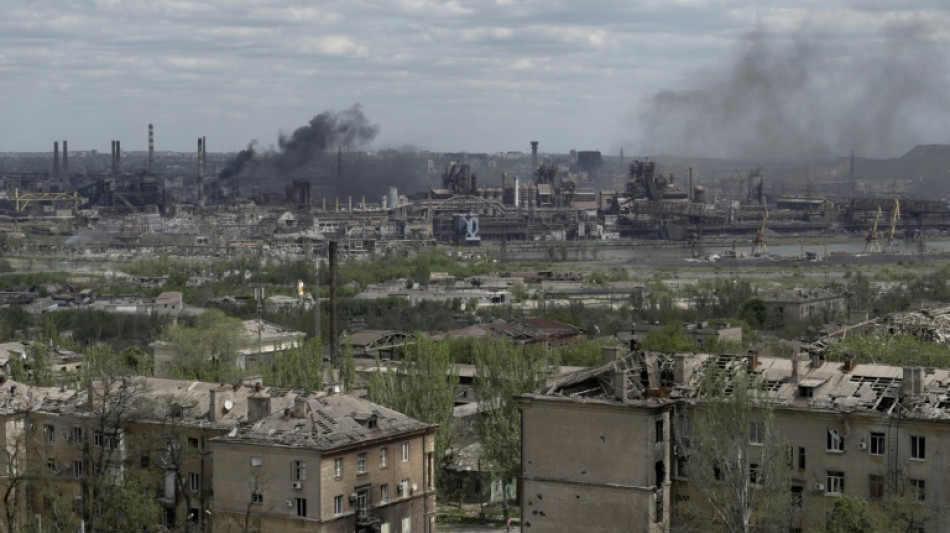
-
 Malinin meltdown hands Shaidorov Olympic men's figure skating gold
Malinin meltdown hands Shaidorov Olympic men's figure skating gold
-
Top seed Fritz makes ATP Dallas semis with fantastic finish

-
 Patriots star receiver Diggs pleads not guilty to assault charges
Patriots star receiver Diggs pleads not guilty to assault charges
-
Havana refinery fire under control as Cuba battles fuel shortages
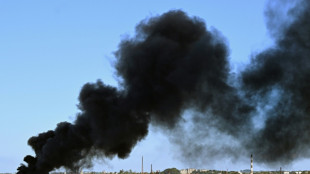
-
 Peru Congress to debate impeachment of interim president on Tuesday
Peru Congress to debate impeachment of interim president on Tuesday
-
Snowboard veteran James targets 2030 Games after Olympic heartbreak

-
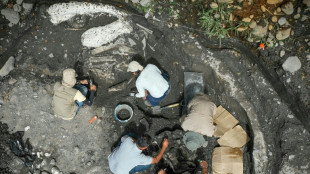 Costa Rica digs up mastodon, giant sloth bones in major archaeological find
Costa Rica digs up mastodon, giant sloth bones in major archaeological find
-
Trump says change of power in Iran would be 'best thing'

-
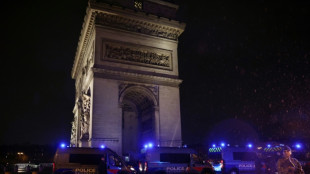 Paris police shoot dead knife man at Arc de Triomphe
Paris police shoot dead knife man at Arc de Triomphe
-
Japan's Totsuka wins Olympic halfpipe thriller to deny James elusive gold

-
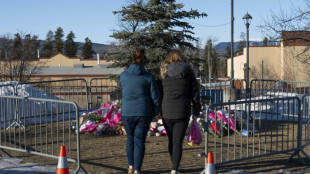 Canada's PM due in mass shooting town as new details emerge
Canada's PM due in mass shooting town as new details emerge
-
Neto treble fires Chelsea's FA Cup rout of Hull

-
 Arbitrator rules NFL union 'report cards' must stay private
Arbitrator rules NFL union 'report cards' must stay private
-
Dortmund thump Mainz to close in on Bayern

-
 WHO sets out concerns over US vaccine trial in G.Bissau
WHO sets out concerns over US vaccine trial in G.Bissau
-
Skeleton racer Weston wins Olympic gold for Britain

-
 Ex-CNN anchor pleads not guilty to charges from US church protest
Ex-CNN anchor pleads not guilty to charges from US church protest
-
Berlin premiere for pic on jazz piano legend Bill Evans

-
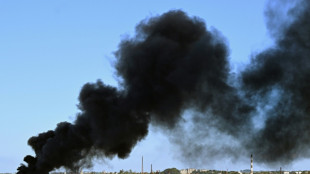 Fire at refinery in Havana as Cuba battles fuel shortages
Fire at refinery in Havana as Cuba battles fuel shortages
-
A Friday night concert in Kyiv to 'warm souls'

-
 PSG stunned by rampant Rennes, giving Lens chance to move top
PSG stunned by rampant Rennes, giving Lens chance to move top
-
Japan's Totsuka wins Olympic halfpipe thriller as James misses out on gold

-
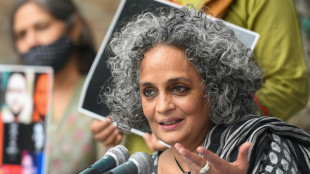 Indian writer Roy pulls out of Berlin Film Festival over Gaza row
Indian writer Roy pulls out of Berlin Film Festival over Gaza row
-
Conflicts turning on civilians, warns Red Cross chief

-
 Europe calls for US reset at security talks
Europe calls for US reset at security talks
-
Peru leader under investigation for influence peddling

-
 Rising star Mboko sets up Qatar Open final against Muchova
Rising star Mboko sets up Qatar Open final against Muchova
-
Canada PM to mourn with grieving town, new details emerge on shooter

-
 US waives Venezuela oil sanctions as Trump says expects to visit
US waives Venezuela oil sanctions as Trump says expects to visit
-
NBA star Chris Paul retires at age 40 after 21 seasons

-
 WTO chief urges China to shift on trade surplus
WTO chief urges China to shift on trade surplus
-
Vonn hoping to return to USA after fourth surgery on broken leg

-
 Trump sending second aircraft carrier to pile pressure on Iran
Trump sending second aircraft carrier to pile pressure on Iran
-
Heraskevych loses Olympics disqualification appeal, Malinin eyes second gold
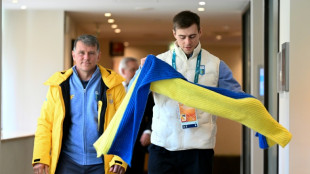
-
 Mercedes have 'taken a step back': Russell
Mercedes have 'taken a step back': Russell
-
Madagascar cyclone death toll rises to 40, water, power still out
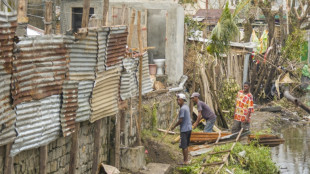
-
 Earl says England inspired by last year's Calcutta Cup
Earl says England inspired by last year's Calcutta Cup
-
USA romp past Dutch in T20 World Cup to keep Super Eight hopes alive

-
 De Minaur scraps past local legend van de Zandschulp
De Minaur scraps past local legend van de Zandschulp
-
Ukrainian Heraskevych loses appeal against Olympics disqualification
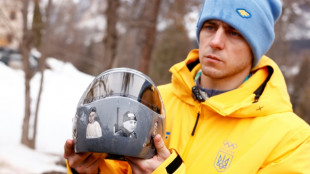
-
 Ghana rallies round traditional tunic after foreign mockery
Ghana rallies round traditional tunic after foreign mockery
-
Forest set to hire former Wolves boss Pereira: reports

-
 England rugby captain Itoje slams Ratcliffe's 'ridiculous' immigration comments
England rugby captain Itoje slams Ratcliffe's 'ridiculous' immigration comments
-
Europe should speak to Russia with 'one voice', Putin foe says

-
 US Congress impasse over immigration set to trigger partial shutdown
US Congress impasse over immigration set to trigger partial shutdown
-
US to deploy new aircraft carrier to Middle East as Trump warns Iran

-
 Ubisoft targets new decade of 'Rainbow 6' with China expansion
Ubisoft targets new decade of 'Rainbow 6' with China expansion
-
Stocks trend lower as AI disruption worries move to fore

-
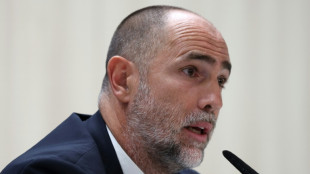 Spurs set to hire Tudor as interim boss until end of season: reports
Spurs set to hire Tudor as interim boss until end of season: reports
-
International crew en route to space station


Oscar-nominated '20 days in Mariupol': from normality to ruins
Laying out the horrors of the early days of Russia's invasion of Ukraine, documentary "20 days in Mariupol" was on Tuesday nominated for an Oscar.
Almost two years on from the start of Russia's attack, the film recounts the dying days of a major city.
"Wars start with silence", filmmaker Mstyslav Chernov says on day one of the 2022 onslaught, as he enters Mariupol by car with his colleague, Associated Press photographer Evgeniy Maloletka.
The journalists, both Ukrainian, know that the southern strategic port will be one of the first targets for Moscow's troops.
Chernov films the last images of a still "normal" city before it was reduced to rubble.
As the shelling begins, the pair encounter a horrified woman asking what she should do.
"They don't shoot civilians," Chernov reassures her, telling the woman to return to her home -- only to add in voice-over: "I was wrong".
Her neighbourhood is bombed soon after and the filmmakers find her again in a gym where hundreds of families are sheltering.
Images of so many men, women and children leave the viewer wondering how many lives will be claimed by the war.
Chernov has a premonition that "something terrible" is coming to Mariupol.
Just three days into their attack, Russian forces began encircling the city, while a quarter of its population had fled.
Those left behind would face carnage.
Chernov said on Tuesday that he hoped the Oscar nomination would bring more people to see the film.
"I feel that I owe the people of Mariupol, and it's my duty to make sure that their stories not forgotten," he said.
- 'Film it! Show it!' -
One week into the war, Chernov and Maloletka are the only international reporters still in Mariupol.
On their perch at the hospital -- one of the only sites enjoying some degree of protection -- they witness the deaths of children and parents' fathomless grief.
Managing to show respect even through the chaos, Chernov films weeping doctors' desperate struggle to save the life of a four-year-old girl, Evangelina.
A father is seen moaning over the dead body of his "beloved son" Ilya, 16, while the parents of 18-month-old Kyrill simply collapse.
"Film it! Show it!" one doctor at the end of his tether urges the cameraman.
The lens captures stretcher-bearers' frantic dashing, people lying in the corridors shaken by bombardment, blood, suffering and nurses taking a brief cigarette break.
"The world has fallen apart and we're smoking," one says with a smile, as if to keep the horror at bay.
Getting their images to the outside world becomes an obsession for the two journalists, even as Mariupol is under siege and cut off.
They encounter wild-eyed people and bodies lying in the street as they step out to search for mobile signal and to film the city's death throes.
People stripped of emotion calmly loot a shop in front of the camera as the owner pleas and a soldier barks for "solidarity".
"The city has changed so fast," Chernov narrates.
As the camera records bodies tossed into mass graves, he adds: "My brain will desperately want to forget all this, but the camera will not let it happen".
"If the world saw everything that happened in Mariupol, it would give at least some meaning to this horror," he hopes.
- Maternity hospital -
On March 9, the war's 14th day, Mariupol's maternity hospital was bombed.
The AP journalists' images of that day have become landmark documents of the war and of atrocities attributed to Russian forces in Ukraine.
When the pair hear Moscow has accused them of staging the pictures with actors, they hunt out the survivors.
But they learn that Iryna, a pregnant woman whose picture on a stretcher was seen worldwide, died with her baby.
They follow the difficult birth of a baby girl to one of the survivors in their quest to get proof out to the world.
In the end, Ukrainian special forces were sent in a high-stakes mission to retrieve the journalists and keep them out of Russian hands as the invaders entered the city.
Leaving Mariupol in a Red Cross convoy, Chernov cannot help but think of those he is "abandoning", whose "tragedies will never be known".
At least 25,000 people died in the 86-day siege of Mariupol, according to authorities in Ukraine, where the fighting remains fierce.
B.Finley--AMWN
